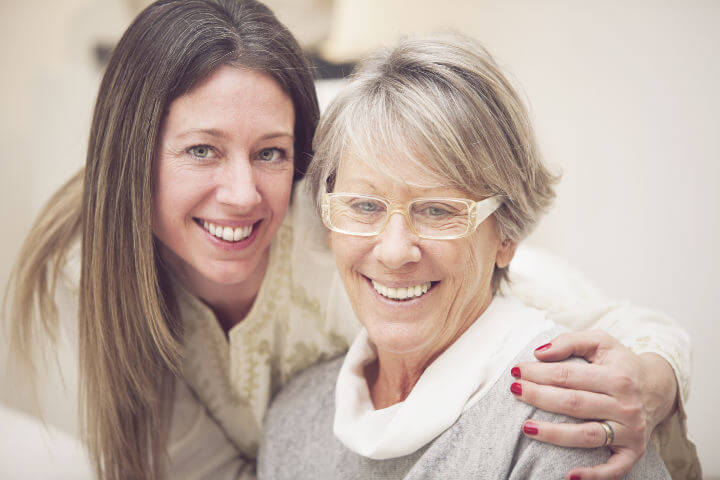
Many people feel a high degree of fear and apprehension when they imagine one of their parents diagnosed with a debilitating illness. Many adult children have never quite stopped seeing their parents as a provider, the person to go to in times of need, the one who will make everything alright. The moment when these roles really change can be a difficult one.
Parents can find this shift in relationship hard as well. It’s a big adjustment for someone who is accustomed to organizing their own life, and sometimes others lives as well, to realize that they now need to depend on others. Many older people are stubborn, especially in relation to their children. Listening to advice and letting someone else make decisions may not come naturally. Finding the right balance between adequate care and over protection can be difficult and stressful. The more this stress can be shared between several children, or among a group of children, the easier it will be for everyone to cope.
A Long-term Care Diagnosis
Many conditions can require a parent to need long-term care. Alzheimer’s disease is one of the most common of these conditions. This disease, along with other forms of progressing dementia, presents challenging situations since individuals lose not just physical functions, but mental ones as well. Parents can have major personality changes and may eventually fail to recognize even their own children. Quite a few other illness can also leave an older person disabled for a significant period of time, from simple broken bones, to various types of cancer, to a stroke or a heart attack.
With any condition of this nature, the family needs to have a group discussion about how to divide responsibilities. Most children and parents alike would prefer to handle the situation at home for as long as possible. This can give the individual more independence and maintain a high quality of life for longer. But for a parent who needs significant aid with daily activities and personal care, this can put a heavy burden on the person chosen as the primary caregiver.
Caregiver stress
 Long-term caregivers have a very difficult job. According to the Alzheimer’s Association, 60% of Alzheimer’s caregivers rate their job has high stress, while 40% suffer from depression. Anyone with a giving personality who enjoys helping others has a natural affinity for this type of role. Unfortunately, constant giving can be very unhealthy, even when it’s part of a professional job. For family members who are more attached to the person they are caring for, it can be even more of a strain.
Long-term caregivers have a very difficult job. According to the Alzheimer’s Association, 60% of Alzheimer’s caregivers rate their job has high stress, while 40% suffer from depression. Anyone with a giving personality who enjoys helping others has a natural affinity for this type of role. Unfortunately, constant giving can be very unhealthy, even when it’s part of a professional job. For family members who are more attached to the person they are caring for, it can be even more of a strain.
Watching a loved one slowly become less capable takes a constant toll on the emotions of family members. Even when we love our parents, dealing with their idiosyncrasies and stubbornness on a day to day basis can easily become irritating. Many non-professional caregivers also have other responsibilities, such as a full time job or children of their own. Making everything work often involves cutting down on “me-time”, the positive things one normally does to recharge.
Caregiver Burnout
Caregiver burnout is a very real problem. Too much stress can leave one empty inside and may even translate into neglect or resentment toward the person that the caregiver is caring for. Often, children feel they will never have a second chance to prove their love to their parents. They are anxious about being the ideal caretaker and may see every effort to maintain a life outside of the job as weakness. This desperation to be perfect is a set-up for failure because it encourages one person to take on more responsibility than they can handle. This is detrimental to a their well-being in the long run.
There are many signs that someone has tried to give more than they are capable. These are some of the most common indications of caregiver burnout:
- Constantly snapping at people, sometimes for no reason.
- Anger toward the person you are caring for.
- Poor eating habits.
- Weight gain or loss.
- Depression.
- Trouble sleeping.
- Constantly catching colds or other minor illnesses.
- Lack of regular exercise.
- Unwillingness to schedule personal time, or social activities.
Sharing Responsibilities
If the parent moves in with one child this will tend to overbalance the load and make one person feel more strained. It is sometimes better if the parent is able to stay in their own home so that the task of aiding them doesn’t always fall exclusively to the child with whom they live.
Burnout is an issue that children and parents should think about and discuss at the very beginning of an illness. Just because one child has a personality that naturally makes them take on the role of caregiver doesn’t mean this should be their exclusive task. It’s better to establish shifts. Weekly, daily, or monthly rotation can all be effective, as long as there’s adequate down time between each stint in order to establish a life and some outside interests. This way the difficulties of care will be shared equally among the children. Parental time will also be spread equally, which can help to eliminate any underlying feelings of jealousy or resentment.
Utilizing Home Care
Adding home care into the rotation can help to ease the burden considerably. Children would often prefer to handle everything themselves, but having professional home care may really be in their parent’s best interest. The quality of the time spend with a parent is more important than the number of hours. Anxiety and stress will quickly sour the relationship and the parent may come to feel he or she is a burden.
Home care agents can help with many areas of life, including minor medical care, personal assistance, grocery shopping, meal preparation, social interaction, or transportation to an activity. Agents are trained in the tasks they complete and may often be more familiar with the challenges facing older disabled people. They can help to find solutions and ease the tensions created by the difficult experience of watching a parent become weaker. Many older people actually value the input of a non-judgmental professional and it may help them to become more comfortable with their new role.
Contact Caring Hands Matter Today!
If you have a parent in need of care, contact Caring Hands Matter to discuss your options. Almost any level of care is possible, and the program may even be covered by insurance. The goal is not to take the place of adult children, but to share the responsibility among as many people as possible.
Having capable professionals handle some of the load will leave family members more free to relax and enjoy the their time together. If you are, or know, a elderly individual in need of care, please call or contact Caring Hands Matter online or call us directly to learn about our beneficial services.